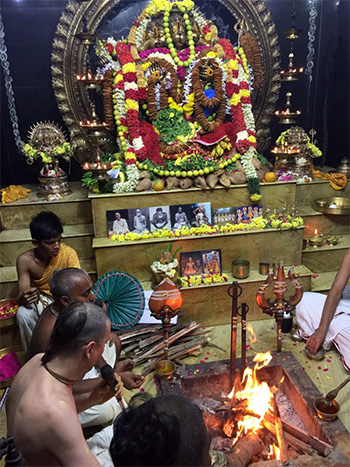Question: One of my friends from Southern Karnataka normally refers to local deities like Hai Guli, Kalkutka, Babbuya, Umalthi, Panjurli, etc. These deities are often worshipped to recover lost animals like sheep or bulls. I request you to kindly throw some light on such gods, demigods, or whatever you prefer to call them.
Thank you for writing with your question. The above deities you mention belong to the categories of bhutas, yakshas and other very low entities. When I use the word “low”, it is in connection with the “high” devas such as Agni, Chandra, Varuna, etc. Practically these species are the closest to us, existing just one or two dimensions above our own. Many higher earthly species can receive a type of “nourishment” through worship, and thus they offer benedictions to people in exchange for worship. Since they belong to very close dimensions, their control over nature is very minimal, and the benedictions they can offer are quite trivial. The village deities that are very common in India are usually nothing more than bhutas. The worship of these entities falls within the modes of ignorance and passion, as stated by Lord Krishna in the Bhagavad Gita (17.4):
yajante sattvika devan
yaksha-rakshamsi rajasah
pretan bhuta-ganams canye
yajante tamasa janah
“Men in the mode of goodness worship the demigods (devas); those in the mode of passion worship the demons (yakshas and rakshasas); and those in the mode of ignorance worship ghosts and spirits (bhutas and pretas).”
Worship in the modes of ignorance (tamas) and passion (rajas) ultimately leads one into further bondage and suffering. One’s destination is described by Lord Krishna as follows (Bhagavad Gita 9.25):
yanti deva-vrata devan
pitrin yanti pitri-vratah
bhutani yanti bhutejya
yanti mad-yajino ‘pi mam
“Those who worship the demigods will take birth among the demigods; those who worship ghosts and spirits will take birth among such beings; those who worship ancestors go to the ancestors; and those who worship Me will live with Me.”
By worshipping the demigods (devas) one will later be elevated to Svargaloka, by worshipping the forefathers one will be elevated to Pitruloka, and by worshipping the bhutas one will himself become a bhuta (ghostly being).
Those who worship Lord Krishna are given a separate destination altogether. Lord Krishna’s states, yanti mad-yajino ‘pi mam, “Those who worship Me come directly to Me.” By worshipping Lord Krishna one is elevated to the Lord’s spiritual abode of Vaikuntha. If one is serious about his ultimate welfare, he will take directly to the service of Sri Hari and deliver himself from the cycle of birth and death, samsara. Though worshipping the devas or forefathers elevates one to a higher material abode, ultimately one is still stuck in the cycle of birth and death. Eventually one will again fall down to this earthly abode, where suffering is inherent in every step:
kshine punye martya lokam vishanti
“When their punya (pious results) are exhausted, they again fall down to the abode of death (the earthly realm).” (Bhagavad Gita 9.21)
In contrast to this, Lord Krishna describes His own spiritual abode as follows (Bhagavad Gita 8.21)
avyakto ‘kshara ity uktas
tam ahuh paramam gatim
yam prapya na nivartante
tad dhama paramam mama
“That supreme abode is called unmanifested and infallible, and it is the supreme destination. When one goes there, he never comes back. That is My supreme abode.”
Thus it is important for sadhakas and devotees to clearly understand who is their object of worship and what is their ultimate destination. It is not true that all worship brings the same result. In the Gita we find the following warning:
antavat tu phalam tesham
tad bhavaty alpa-medhasam
devan deva-yajo yanti
mad-bhakta yanti mam api
“Men of small intelligence worship the demigods (devas), and their fruits are limited and temporary. Those who worship the demigods go to the planets of the demigods, but My devotees ultimately reach My supreme planet.”
For those who worship the devas, bhutas, yakshas, etc., there is always danger and uncertainty, for the pious results they attain are temporary and subject to the results of their karma. The devotees of the Lord, on the other hand, are always personally protected by Lord Krishna. To them there is no uncertainty, and their attainment of Lord Krishna’s supreme abode is guaranteed, for Lord Krishna personally assists them:
ananyash cintayanto mam
ye janah paryupasate
tesham nityabhiyuktanam
yoga-kshemam vahamy aham
“But those who worship Me with devotion, meditating on My transcendental form – to them I carry what they lack and preserve what they have.”
Receive our daily email newsletter on Hinduism, Yoga, Meditation, Ayurveda and Natural Healing.






